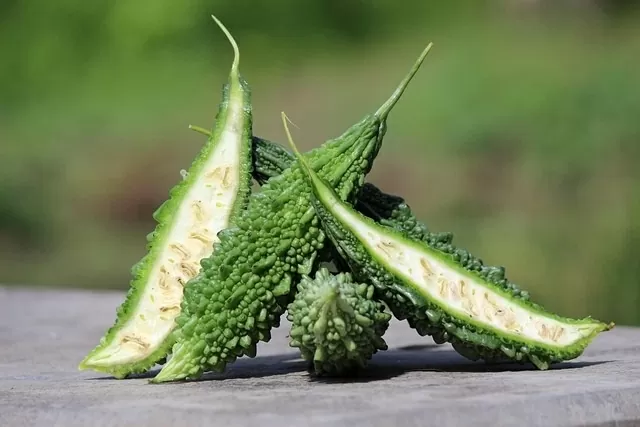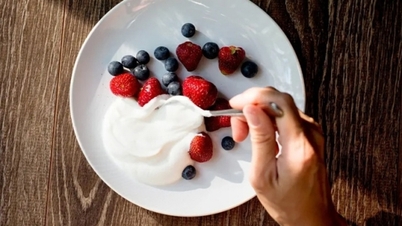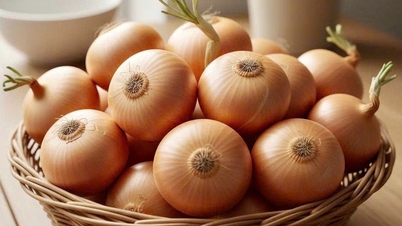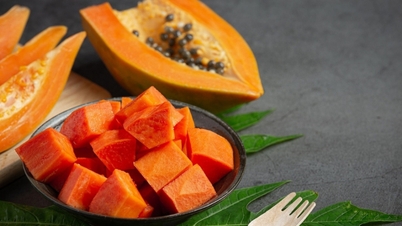 |
| Adding bitter melon to your diet can help control fatty liver. (Source: Pixabay) |
Fatty liver is a common disease that affects thousands of people around the world . In addition to medication and other preventive measures, some fruits and vegetables contain specific nutrients that help protect liver health, reduce fat accumulation, and repair liver damage.
Regularly adding these vegetables to a balanced diet is a natural way to boost liver function and overall health.
Below are 5 types of vegetables and fruits that can help reduce fatty liver.
Broccoli
Broccoli is beneficial for the liver because it contains fiber and antioxidants - two essential components that help enhance fat breakdown and prevent fat accumulation in the liver.
Animal studies show that broccoli supplementation reduces liver fat and significantly improves liver function.
In addition, vitamin C in broccoli helps strengthen the immune system and protect liver cells from damage. Regularly eating broccoli, whether steamed, grilled or mixed in salads, will help the body recover from fatty liver.
Broccoli is also considered a natural "shield" for the liver, thanks to its ability to detoxify and effectively regenerate liver tissue.
Spinach
Spinach is good for the liver because it contains many antioxidants, vitamins and minerals that help fight inflammation and reduce oxidative stress - two main factors that cause liver cell damage. Chlorophyll combined with fiber and carotenoids in this vegetable helps protect liver cells and enhance the process of breaking down fat.
Eating spinach regularly helps the liver detoxify more effectively, reduces fat accumulation and speeds up the recovery process of liver function. You can use fresh spinach in salads, or stir-fry or lightly boil it to add to your daily dishes.
Maintaining the habit of eating spinach in your diet will significantly improve fatty liver condition and enhance overall health.
Bitter melon
Bitter melon is considered a "double medicine" for the liver, because it helps control blood sugar and blood fat, and prevents fat accumulation in the liver. The active ingredients in bitter melon help increase insulin sensitivity, reduce cholesterol, thereby reducing pressure on the liver.
At the same time, the natural bitter compounds in this fruit also stimulate the liver to function more effectively and support the breakdown of accumulated fat tissue.
In traditional medicine, bitter melon is often used to cook soup or stir-fry to support the treatment of liver-related diseases. Adding bitter melon to your daily diet has a natural effect in controlling fatty liver and maintaining healthy liver function.
Kale
Kale is a leafy green vegetable rich in nutrients and antioxidants, providing vitamins A, C, K and fiber - important ingredients to help protect and purify the liver. The antioxidants in kale help reduce inflammation and help the liver remove toxins from the body.
The fiber in kale helps improve digestion and weight control, thereby limiting the accumulation of fat in the liver. You can blend it into smoothies, salads, or lightly cook it to get the most out of this vegetable.
Thanks to its high phytochemical content, kale is considered an essential food that helps prevent and support the treatment of fatty liver, while improving liver function naturally.
Spinach
Water spinach contains fiber, vitamins and minerals that help support liver function by eliminating toxins and reducing cholesterol in the blood. Regular consumption of water spinach helps enhance fat metabolism, reduce fat accumulation in the liver and protect the liver from damage.
Water spinach is easy to prepare, cooks quickly and can be incorporated into many daily dishes, increasing its nutritional value while helping to maintain a healthy liver. In the diet of many Asian countries, water spinach is a popular dish thanks to its ability to naturally protect the liver and slow the progression of fatty liver.
Source: https://baoquocte.vn/them-5-loai-rau-nay-vao-bua-an-de-cai-thien-gan-nhiem-mo-330550.html


![[Photo] Opening of the World Cultural Festival in Hanoi](https://vphoto.vietnam.vn/thumb/1200x675/vietnam/resource/IMAGE/2025/10/10/1760113426728_ndo_br_lehoi-khaimac-jpg.webp)



![[Photo] General Secretary attends the parade to celebrate the 80th anniversary of the founding of the Korean Workers' Party](https://vphoto.vietnam.vn/thumb/1200x675/vietnam/resource/IMAGE/2025/10/11/1760150039564_vna-potal-tong-bi-thu-du-le-duyet-binh-ky-niem-80-nam-thanh-lap-dang-lao-dong-trieu-tien-8331994-jpg.webp)
![[Photo] Discover unique experiences at the first World Cultural Festival](https://vphoto.vietnam.vn/thumb/1200x675/vietnam/resource/IMAGE/2025/10/11/1760198064937_le-hoi-van-hoa-4199-3623-jpg.webp)




























![[Photo] Ho Chi Minh City is brilliant with flags and flowers on the eve of the 1st Party Congress, term 2025-2030](https://vphoto.vietnam.vn/thumb/1200x675/vietnam/resource/IMAGE/2025/10/10/1760102923219_ndo_br_thiet-ke-chua-co-ten-43-png.webp)































































Comment (0)